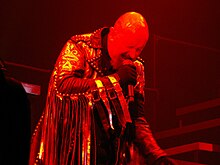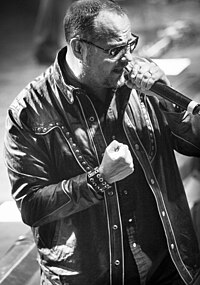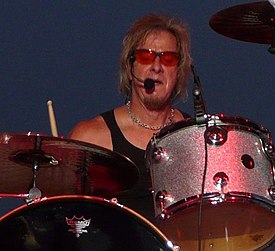Judas Priest are an English heavy metal band from Birmingham. Formed in September 1969, the group originally featured vocalist Al Atkins, guitarist John Perry (who died shortly after their formation and was replaced by Ernie Chataway), bassist Bruno Stapenhill and drummer John Partridge. [1] Partridge was replaced by Fred Woolley in 1970 [2] shortly before the band broke up after just seven months, [3] at which point Atkins joined a group called Freight which featured guitarist Kenneth "K. K." Downing, bassist Ian Hill and drummer John Ellis. [4] Freight soon took over the Judas Priest moniker and underwent a succession of drummer changes: Alan Moore replaced Ellis in 1971, who was followed by Chris "Congo" Campbell, and later John Hinch in 1973. [5] Hinch joined alongside his Hiroshima bandmate Rob Halford, after Atkins decided to leave due to the band's frustrations trying to sign a record deal. [1]
History

Upon signing a deal with record label Gull in April 1974, Judas Priest enlisted Flying Hat Band frontman Glenn Tipton as co lead guitarist. [6] After the release and promotion of the band's debut album Rocka Rolla, Hinch was replaced by the returning Moore. [7] The drummer performed on Sad Wings of Destiny, but left again during the sessions for its follow-up Sin After Sin, which were completed by session contributor Simon Phillips. [8] For the album's promotional tour, Les Binks was brought in on drums. [4] Binks remained for the albums Stained Class and Killing Machine, before he was replaced by former Trapeze drummer Dave Holland in August 1979. [9] This lineup proved to be the most stable to date, producing six studio albums: British Steel, Point of Entry, Screaming for Vengeance, Defenders of the Faith, Turbo and Ram It Down. [4]

In November 1989, Scott Travis replaced Holland and debuted on Painkiller. [10] The album was the last at the time to feature Halford, who later left in May 1992. [11] The group went on hiatus for a few years, before enlisting Tim "Ripper" Owens – frontman of a Judas Priest tribute act called British Steel – as Halford's replacement in May 1996. [12] Owens recorded two albums with the band – 1997's Jugulator and 2001's Demolition – before Halford rejoined in July 2003. [13] Angel of Retribution and Nostradamus followed, before Downing left and was replaced by Richie Faulkner in April 2011. [14] The guitarist's departure was reportedly due to differences with other band members and management. [4] In February 2018, Tipton ceased touring full-time with the band after being diagnosed with Parkinson's disease, with Andy Sneap taking his place on tour, [15] and Tipton making occasional appearances on subsequent tours. [16]
Members
Current
| Image | Name | Years active | Instruments | Release contributions |
|---|---|---|---|---|
| Ian Hill |
|
|
all Judas Priest releases | |
| Glenn Tipton |
|
| ||
| Rob Halford |
|
lead vocals | all Judas Priest releases from Rocka Rolla (1974) to Painkiller (1990), and from Angel of Retribution (2005) onwards | |
| Scott Travis |
|
|
all Judas Priest releases from Painkiller (1990) onwards | |
| Richie Faulkner | 2011–present |
|
all Judas Priest releases from Redeemer of Souls (2014) onwards |
Former
| Image | Name | Years active | Instruments | Release contributions |
|---|---|---|---|---|
| K. K. Downing |
|
|
all Judas Priest releases from Rocka Rolla (1974) to A Touch of Evil: Live (2009) | |
| John Ellis | 1970–1971 | drums | none | |
| Alan "Skip" Moore |
|
Sad Wings of Destiny (1976) | ||
| Chris "Congo" Campbell | 1972–1973 | none | ||
| John Hinch | 1973–1975 (died 2021) | Rocka Rolla (1974) | ||
| Simon Phillips | 1977 | Sin After Sin (1977) | ||
| Les Binks |
|
| ||
| Dave Holland | 1979–1989 (died 2018) | all Judas Priest releases from British Steel (1980) to Ram It Down (1988) | ||
| Tim "Ripper" Owens | 1996–2003 | lead vocals | all Judas Priest releases from Jugulator (1997) to Live in London (2003) |
Session and Touring
| Image | Name | Years active | Instruments | Release contributions |
|---|---|---|---|---|
| Jeff Martin | 1985–1986 (session only) | backing vocals | Turbo (1986) | |
| Don Airey |
|
|
| |
| Andy Sneap |
|
|
|
Early members
| Image | Name | Years active | Instruments | Release contributions |
|---|---|---|---|---|
| Al Atkins |
|
lead vocals | none | |
| Brian "Bruno" Stapenhill | 1969–1970 | bass guitar | ||
| John Partridge | drums | |||
| John Perry | 1969 (until his death) | guitar | ||
| Ernie Chataway | 1969–1970 (died 2014) | |||
| Fred Woolley | 1970 | drums |
Timeline

Lineups
| Period | Members | Releases |
|---|---|---|
| September — November 1969 |
|
none |
| November 1969 – March 1970 |
| |
| March — April 1970 |
| |
| Band inactive April – October 1970 | ||
| October 1970 – June 1971 |
|
none |
| June 1971 – June 1972 |
| |
| June 1972 – May 1973 |
| |
| May 1973 – April 1974 |
| |
| April 1974 — October 1975 |
|
|
| October 1975 – January 1977 |
|
|
| January – March 1977 |
|
|
| March 1977 – July 1979 |
|
|
| August 1979 – October 1989 |
|
|
| November 1989 – May 1992 |
|
|
| Band inactive May 1992 – May 1996 | ||
| May 1996 – July 2003 |
|
|
| July 2003 – April 2011 |
|
|
| April 2011 – February 2018 |
|
|
| February 2018 – 10 January 2022 |
|
Firepower World Tour |
| 10–15 January 2022 |
|
none |
| 15 January 2022 – present |
|
|
References
- ^ a b Rivadavia, Eduardo (6 December 2014). "Judas Priest Lineup Changes: A Complete Guide". Ultimate Classic Rock. Retrieved 25 December 2015.
- ^ "Judas Priest early years". www.brumbeat.net. Retrieved 20 April 2023.
- ^ "Judas Priest's Co Founding Guitarist Ernie Chataway Dead At 62". Blabbermouth.net. 14 May 2014. Retrieved 16 July 2019.
- ^ a b c d Erlewine, Stephen Thomas. "Judas Priest: Biography & History". AllMusic. Retrieved 25 December 2015.
- ^ Popoff 2007, pp. 5–7
- ^ Popoff 2007, p. 8
- ^ Popoff 2007, p. 39
- ^ Popoff 2007, p. 44
- ^ Daniels, Neil (4 July 2008). "Obituary: Mel Galley". The Guardian. Retrieved 16 July 2019.
- ^ "Norfolk native Scott Travis wins Grammy with Judas Priest". The Virginian-Pilot. 1 February 2010. Retrieved 16 July 2019.
- ^ Daniels, Neil (7 April 2010). The Story of Judas Priest: Defenders of the Faith. London, England: Omnibus Press. p. 11. ISBN 978-0857122391. Retrieved 16 July 2019.
- ^ Revkin, Andrew C. (27 July 1997). "A Metal-Head Becomes A Metal-God". The New York Times. Retrieved 16 July 2019.
- ^ Wiederhorn, Jon (14 July 2003). "Judas Priest Discuss Emotional Reunion, Leaving Ripper Owens Behind". MTV. Retrieved 27 December 2015.
- ^ Michaels, Sean (21 April 2011). "Last rites: KK Downing quits Judas Priest just before farewell tour". The Guardian. Retrieved 27 December 2015.
- ^ Snapes, Laura (12 February 2018). "Judas Priest's Glenn Tipton diagnosed with Parkinson's disease". The Guardian. Retrieved 12 February 2018.
- ^ Kaufman, Spencer (31 March 2022). "Glenn Tipton on Judas Priest's 2022 tour, upcoming album, Rock Hall nomination, and more". Consequence. Retrieved 30 March 2023.
- ^ Sneap toured with Judas Priest in place of Tipton, following his Parkinson's disease diagnosis. He was dismissed when the band announced it was going to become a quartet in 2022. After five days, Sneap was asked to come back and Judas Priest became a five-piece again.
Bibliography
- Popoff, Martin (8 November 2007), Judas Priest: Heavy Metal Painkillers – An Illustrated History, Toronto, Ontario, Canada: ECW Press, ISBN 978-1550227840
















